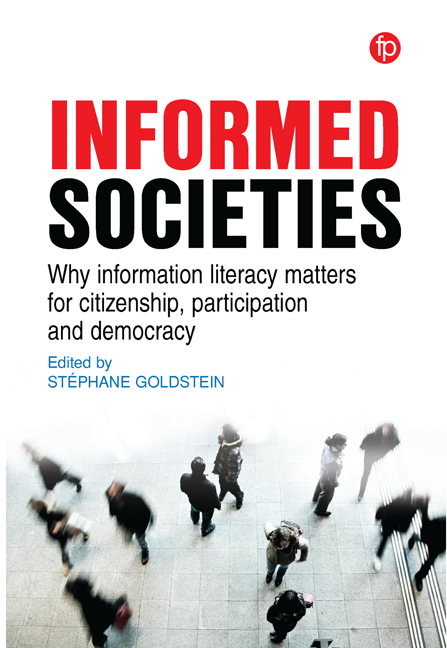Book contents
- Frontmatter
- Contents
- Figures and Tables
- Notes on the authors
- Foreword
- Introduction
- 1 Information Literacy in the Digital Age: Why Critical Digital Literacy Matters for Democracy
- 2 The Discourses of Power, Information and Literacy
- 3 What Intellectual Empathy Can Offer Information Literacy Education
- 4 The ‘Post-Truth’ World, Misinformation, and Information Literacy: a Perspective From Cognitive Science
- 5 Media and Information Literacy: Intersection and Evolution, a Brief History
- 6 Information Literacy and National Policy Making
- 7 Information Literacy as a Growth Pillar for a Fledgling Democracy
- 8 Information literacy and the Societal Imperative of Information Discernment
- 9 Libraries and Democracy: Complementarity in a Regime of Truth
- 10 Scottish Public Libraries Welcome Syrian New Scots: a Transition from Being a Refugee to Becoming an Active Part of the Community
- 11 Information Literacy, Lifelong Learning and the Needs of an Ageing Population
- Index
8 - Information literacy and the Societal Imperative of Information Discernment
Published online by Cambridge University Press: 22 February 2020
- Frontmatter
- Contents
- Figures and Tables
- Notes on the authors
- Foreword
- Introduction
- 1 Information Literacy in the Digital Age: Why Critical Digital Literacy Matters for Democracy
- 2 The Discourses of Power, Information and Literacy
- 3 What Intellectual Empathy Can Offer Information Literacy Education
- 4 The ‘Post-Truth’ World, Misinformation, and Information Literacy: a Perspective From Cognitive Science
- 5 Media and Information Literacy: Intersection and Evolution, a Brief History
- 6 Information Literacy and National Policy Making
- 7 Information Literacy as a Growth Pillar for a Fledgling Democracy
- 8 Information literacy and the Societal Imperative of Information Discernment
- 9 Libraries and Democracy: Complementarity in a Regime of Truth
- 10 Scottish Public Libraries Welcome Syrian New Scots: a Transition from Being a Refugee to Becoming an Active Part of the Community
- 11 Information Literacy, Lifelong Learning and the Needs of an Ageing Population
- Index
Summary
Introduction
This chapter explores current research on how young people make judgements about the information they encounter. There will be a discussion on why some young people appear to trust, without question, online information whilst others show remarkable powers of insight and critique. Evidence on how this might affect their physical and mental well-being will be provided. Why this is important both in educational and political terms is discussed. There will then be an exploration of the approaches that can be employed to help young people develop a more discerning approach to engaging with the information they see, hear and read in any context.
The discussion put forward here is based upon a synthesis of research findings involving three groups of young people from the UK – 16–17-year-olds, at a secondary school, 18–19-year-old university students in their first undergraduate year and finally 18–24-year-old men recruited for an experiment, mostly undergraduates – all carried out in the UK. For the first two groups there was a concern voiced by teachers and academic tutors respectively that their students exhibited a noticeable lack of the necessary capabilities to make well-calibrated judgements in order to select good-quality information to support their work for assignments. The 16–17-year-olds were working towards gaining their Extended Project Qualification (EPQ)1 – a mini-dissertation in addition to their A-level study. Walton et al. (2018a) provide a comprehensive reflection of these studies. The 18–19-year-olds were working towards completing their first assignment and had to find good quality information about a sporting issue of their choice (see Walton and Hepworth, 2011; 2013 for a more detailed account). These two groups are quite similar in their context and we will see that their comments and experiences and our analyses align in an encouraging way. How? They both appear to indicate that most (but by no means all) students present with remarkably poor capabilities in making judgements about information, which prevent them from making the most suitable choices. The third group were recruited to find out whether the cognitive process of information discernment has a physiological component. Why? We wanted to find out whether being good at information discernment is related to positive responses to stress.
- Type
- Chapter
- Information
- Informed SocietiesWhy information literacy matters for citizenship, participation and democracy, pp. 149 - 164Publisher: FacetPrint publication year: 2019



